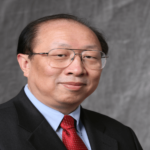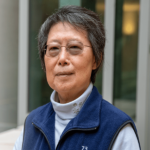Frans Kaashoek
MIT

Title:Verifying Distributed Systems with Concurrent Separation Logic
Abstract
Distributed systems are the foundation of cloud computing and bugs in them can lead to outages of major providers and their customers. Unfortunately distributed systems are also hard to get right because they must handle concurrency, crash recovery, replication, and reconfiguration, which interact in subtle ways. A promising approach to verifying such systems (and thereby systematically eliminating classes of bugs) is based on concurrent separation logic, which allows components to be verified independently yet handle tricky interaction between components.
Biography
Frans Kaashoek is the Charles Piper Professor in MIT’s EECS department and a member of CSAIL, where he coleads the parallel and distributed operating systems group (http://www.pdos.csail.mit.edu/). Frans is a member of the National Academy of Engineering and the American Academy of Arts and Sciences, the recipient of the ACM SIGOPS Mark Weiser award and the 2010 ACM Prize in Computing. He was a cofounder of Sightpath, Inc. and Mazu Networks, Inc. His current research focuses on verification of systems software.
Wei Zhao
Shenzhen University of Advanced Technology

Title: Computer Science – From Classical Computing to Quantum Computing
Abstract
Quantum computing, due to its tremendous potential in accelerating computation, has developed into a frontier in computer science. In this talk, assuming zero knowledge of quantum physics by the audience, we will first introduce the basic concepts of quantum computing. We will then compare the development of classical computing to that of quantum computing. We note that one of the most important contributions made by the computer science community to the human knowledge base, is the development of (run-time) complexity theory which enables comparison and classification of computational problems. We will argue, however, for quantum computing, that in addition to run-time complexity, we need to introduce design complexity to measure (and hence to classify) efforts in program design. We will then discuss various issues in resource management of quantum computing for both centralized and distributed quantum computing systems.
Biography
An internationally renowned scholar, Professor Wei Zhao has served important leadership roles in academia, including the eighth Rector (i.e., President) of the University of Macau, the Dean of Science at Rensselaer Polytechnic Institute, the Director for the Division of Computer and Network Systems in the U.S. NSF, the Chief Research Officer (i.e., VPR) at the American University of Sharjah, the Chair of Academic Council at both Shenzhen University of Advanced Technology, and the Senior Associate Vice President for Research at Texas A&M University.
An IEEE Fellow, Professor Zhao has made significant contributions in cyber-physical systems, distributed computing, real-time systems, computer networks, and cyberspace security. He led the effort to define the research agenda of and to create the very first funding program for cyber-physical systems, when he served as the NSF CNS Division Director in 2006. His research group has received numerous awards. Their research results have been adopted in the standard of DOD SAFENET. In 2011, he was named by the Chinese Ministry of Science and Technology as the Chief Scientist of the national 973 Internet of Things Project.
Professor Zhao was honored with the Lifelong Achievement Award by the Chinese Association of Science and Technology, and the Overseas Achievement Award by the Chinese Computer Federation. He has been conferred honorable doctorates by 12 universities in the world and academician of the International Eurasian Academy of Sciences.
Victor Bahl
Microsoft Corporation

Title: AI infused Unification of the Cloud and Telecommunication Infrastructures
Biography
Victor Bahl is a technical fellow and chief technology officer of Azure for Operators in Microsoft Strategic Missions and Technologies division. Prior to this, he was the founding director of networking research in Microsoft and a member of the senior leadership team in Microsoft Research. With over 35 years of industry and research experience, Dr. Bahl advises Microsoft’s CEO and senior leadership team on long-term strategy related to NextG, edge computing, cloud infrastructures, networked systems, mobile computing & wireless systems. He is the original co-inventor of the edge computing paradigm and architecture and thought leader behind industry-wide edge computing products. He is also one of the architect of the telecommunications and cloud convergence strategy that led to the creation of Microsoft’s Azure for Operators business.
Dr. Bahl has delivered numerous foundational technologies to Azure, XBOX and Windows that span the industry. They shaped new datacenter architectures, new networking protocols and optimizations, new network management systems and new consumer experiences. His evangelism and technical contribution and advocacy of dynamic spectrum access led to the United States FCC opening up 180 MHz of spectrum for unlicensed use. He has published over 130 papers with over 76,000 citations; he is the author/co-author of over 200 patents, and has won three test of time and four best paper awards. For his professional and research leadership he has received numerous prestigious awards including four lifetime achievement awards from the ACM and IEEE organizations. He is the founder/co-founder of ACM SIGMOBILE, MobiSys, GetMobile and several other important conferences and journals. Dr. Bahl is a Fellow of ACM, IEEE, and AAAS.
Lixia Zhang
UCLA

Title:Towards Decentralized Internet Applications
Abstract
Today’s Internet applications are, by and large, running on the cloud servers or relying on them for critical functions including rendezvous and authentication. In this talk, we use the design and implementation of NDN Workspace, a web-based, multi-user collaborative app to showcase a new way to develop Internet applications which are solely controlled by end users. NDN Workspace lets users establish trust relations among each other directly, and collaborate through exchanging secured, URI-identified objects with no reliance on cloud servers.
Biography
Lixia Zhang is a professor in the Computer Science Department of UCLA. She received her Ph.D in computer science from MIT, and worked as a member of the research staff at Xerox Palo Alto Research Center before joining UCLA. She is a fellow of ACM and IEEE, a recipient of IEEE Internet Award and ACM SIGCOMM Lifetime Achievement Award, an inductee of Internet Hall of Fame, and the holder of UCLA Jon Postel Chair in Computer Science. Since 2010 she has been working on the design and development of Named Data Networking, a new Internet protocol architecture (http://named-data.net/).






